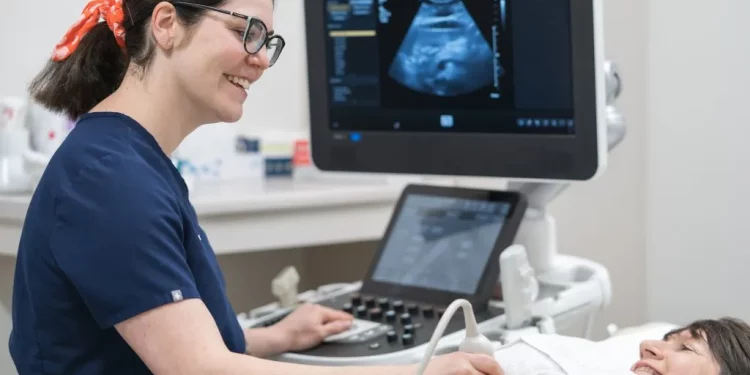In the journey of pregnancy, early scans and screenings stand as pivotal checkpoints, ensuring the health and well-being of both the expectant mother and her baby. London, a city known for its diverse healthcare options, offers a plethora of choices ranging from NHS facilities to private clinics, each providing comprehensive early pregnancy scans and screenings. This blog post aims to guide you through these essential services, highlighting the significance of early scans and the comparative benefits of opting for private ultrasound services.
Table of Contents
Early Pregnancy Scans: The Foundation of Prenatal Care
The journey into parenthood begins with the first glimpse of your baby through an early pregnancy scan, typically conducted between 11 to 14 weeks. This initial scan serves several crucial purposes. Firstly, it establishes an accurate due date, an essential piece of information that guides the management of your pregnancy. Identifying the number of embryos and thereby the presence of a multiple pregnancy is another critical aspect, shaping the approach to prenatal care. Additionally, early scans play a vital role in diagnosing any early pregnancy failures and in the identification of major structural anomalies, setting the stage for necessary interventions or monitoring.
These early scans, foundational to prenatal care, are readily available through NHS services in London. For those seeking a more personalized touch or immediate access, private clinics offer an attractive alternative, providing not only the essential early pregnancy scan but also enhanced privacy, shorter waiting times, and a more intimate setting for this profound experience.
Navigating Chromosomal Conditions and Screening
Another cornerstone of early pregnancy care is screening for chromosomal conditions, such as Down’s syndrome, which is typically conducted around the same time as the early pregnancy scan. These screenings combine maternal age-related risk factors with specific measurements taken during the scan, like the nuchal translucency, to assess the risk of chromosomal imbalances. The importance of these screenings cannot be overstated, as early detection and understanding of chromosomal conditions significantly influence the management of pregnancy and preparation for the baby’s needs post-birth.
While NHS facilities provide comprehensive screening programs, private clinics may offer a broader range of screening options, including advanced non-invasive prenatal testing (NIPT) that isn’t routinely available through the NHS. This option presents an opportunity for expectant parents seeking the most detailed information about their baby’s health.
Assessing the Risk of Preterm Delivery: Cervical Length Check
A critical aspect of mid-pregnancy scans, conducted around 21 to 22 weeks, is the assessment of cervical length to predict the risk of preterm labor. A short cervix can indicate a higher likelihood of early delivery, prompting interventions such as progesterone supplements or cervical cerclage to prevent preterm birth. Additionally, steroid injections may be recommended to enhance lung maturity in babies at high risk of early delivery. These measures are part of a broader strategy to manage preterm delivery risks, which includes ongoing research and individualized care plans.
Both NHS and private healthcare services in London are committed to providing antenatal care that addresses the risk of preterm delivery, with tailored approaches for women with a history of preterm births. Private clinics, in particular, may offer more frequent monitoring and personalized strategies, providing an added layer of support for those with specific concerns or previous experiences of preterm labor.
Private Ultrasound Services: Beyond the Basics
Private ultrasound services in London cater to those seeking beyond the standard offerings of the NHS. These services distinguish themselves by providing immediate appointments, reducing the often lengthy wait times associated with public healthcare. Extended scan times allow for a more in-depth examination and a unique opportunity for parents to bond with their baby. Furthermore, private clinics often have access to the latest prenatal screening technologies, offering advanced options for early detection of potential health issues.
Opting for a private ultrasound scan comes with the benefit of a comfortable and private setting, ensuring a serene and intimate experience. This personalized approach not only caters to the clinical needs of expectant parents but also addresses their emotional well-being, making each visit a memorable part of the pregnancy journey.
Conclusion: Making Informed Choices
The decision between NHS and private ultrasound services ultimately rests on personal preferences, specific needs, and the level of care desired. Early pregnancy scans and screenings are invaluable tools in the management of pregnancy, offering early insights into the baby’s health and development. By understanding the range of services available in London, from the comprehensive care provided by the NHS to the personalized touch of private clinics, expectant parents can make informed decisions that best suit their journey to parenthood.
In the landscape of prenatal care, knowledge is power. Armed with information about the significance of early pregnancy scans and the comparative benefits of NHS versus private options, parents-to-be can navigate their choices with confidence, ensuring a supportive and informed pregnancy experience. Whether through the universal access provided by the NHS or the bespoke services of private clinics, the priority remains the same: the health and well-being of both mother and baby, guided by care, compassion, and comprehensive medical oversight.


 Home
Home









